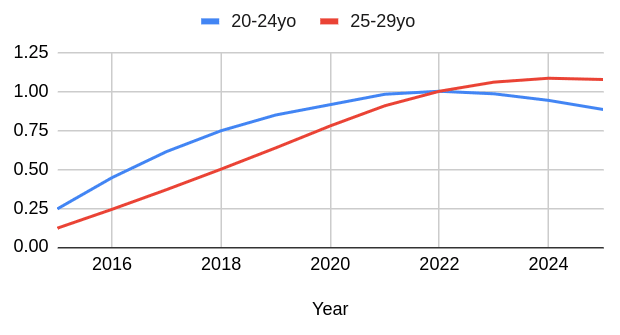We have been hunter gatherer for a couple of hundred thousands years, and farmers for a couple of thousands.
I'd be wary of leaning too hard into this kind of argument, because our evolutionary history goes back more than a hundred thousand years.
Homo Habilis are currently believed to have been opportunistic scavengers at best, given that they weren't adapted well enough to running to do persistence hunting.
> [...they were capable of eating a broad range of foods, including some tougher foods like leaves, woody plants, and some animal tissues...](https://humanorigins.si.edu/evidence/human-fossils/species/homo-habilis)
While Australopithecine were straight-up herbivorous:
> [While the researchers cannot completely rule out the possibility of occasional consumption of animal protein sources like eggs or termites, the evidence indicates a diet that was predominantly vegetarian.](https://www.mpic.de/5631022/vor-drei-millionen-jahren-lebten-unsere-vorfahren-vegetarisch#:~:text=The%20team%20of%20researchers%20found,diet%20that%20was%20predominantly%20vegetarian.)
And hominid species earlier in the line were probably frugivores.
So a fuller version of this story would be that we have millions of years of adaptations to eating fruit and tubers, followed by millions of years of adaptation to also eating meat (initially sporadically and opportunistically, and later through more systematic hunting), followed by [at least tens of thousands of years of adaptation](https://www.sciencedirect.com/science/article/pii/S0899900722001150) to eating grains and dairy ([possibly including the genes that cause celiac](https://www.acsh.org/news/2015/07/08/scientists-think-they-have-an-origin-story-for-celiac-disease#:~:text=Furthermore%2C%20evidence%20implicates%20at%20least%2040%20genes,of%20celiacs%20disease%20is%20a%20good%20one.)).
While all the hunter-gathers in your table eat meat, the table also tells you that they all eat carbs whenever they're available in the environment. A large part of our success as a species was our ability to adapt to and thive on many different kinds of diets, from almost vegetarian to almost carnivorous.
The Hadza reportedly get [10-20% of their calories from honey](https://en.wikipedia.org/wiki/Hadza_people), and in interviews with people who have lived with them I've heard that they prioritize honey even over meat ie even while tracking they'll risk losing their prey if they see a beehive. They need the calories to get through the dry season.
I don't think we have any numerical records for the Coast Salish, but their traditional foods seem to be pretty heavy on berries, both as sauces and dried in big cakes.
EDIT I'm not sure why only the first paragraph got parsed as markdown, or how to fix it.
A reasonable estimate for a sedentary person is https://www.omnicalculator.com/health/bmr-harris-benedict-equation multiplied by 1.2. Plus any activity on top. Worth calculating - you might be at a much bigger calorie deficit than you think.
When I'm at a 200-400 calorie deficit for a while I can still be very active, but my mood feels flat and I have a hard time getting excited about anything.
There have been massive improvements in productivity in infrastructure from cloud services, especially object storage. See eg https://materializedview.io/p/infrastructure-vendors-are-in-a-tough for many examples of small teams out-competing established vendors.
But I didn't notice that until it was pointed out to me by several sources. So should I expect to notice large productivity improvements from LLMs? How huge would they have to be to show up in the sparse signal that I'm getting? What data would I even have to be looking at to see a 5x improvement in productivity?
A friend from Singapore did Express Entry and only took three months. Mine appears to have been longer because the London embassy was in the middle of moving buildings. When I went in for my biometrics it was total chaos - they didn't even have a regular camera setup yet so they tried taking pictures in three different rooms. Then after they approved it they kept failing to actually send the approval paperwork. But it seems like normally the process is pretty fast.
I hear that if you live in, say, India then getting things like police certificates is a lot more expensive and can take a long time.
I wrote about my experience with Canada (instant permanent residency) - https://scattered-thoughts.net/writing/canadas-express-entry-program/. Worth noting that so far this year they haven't offered any places in the regular program - https://www.canada.ca/en/immigration-refugees-citizenship/corporate/mandate/policies-operational-instructions-agreements/ministerial-instructions/express-entry-rounds.html.
Wesley Aptekar-Cassel wrote about his experience with Taiwan (very quick renenewable work visa) - https://notebook.wesleyac.com/taiwan-gold-card/
You can use leechblock to add time restrictions for any site.
It also has the option to add loading delays to sites, which I find useful for sites which I can't afford to block outright.
I've seen some authors use 'subjective experience' for the former and reserve consciousness for the latter. Unfortunately consciousness is one of those words, like 'intelligence', that everyone wants a piece of, so maybe it would be useful to have a specific term for the latter too. 'Reflective awareness' sounds about right, but after some quick googling it looks like that term has already been claimed for something else.
Uncontrolled argues along similar lines - that the physics/chemistry model of science, where we get to generalize a compact universal theory from a number of small experiments, is simply not applicable to biology/psychology/sociology/economics and that policy-makers should instead rely more on widespread, continuous experiments in real environments to generate many localized partial theories.
A prototypical argument is the paradox-of-choice jam experiment, which has since become solidified in pop psychology. But actual supermarkets run many 1000s of in-situ experiments and find that it actually depends on the product, the nature of the choices, the location of the supermarket, the time of year etc.

My wife coaches teen athletes and the signs she's taught to look out for are not weight loss but withdrawal, depression, poor digestion, feeling cold etc. Not to say that you're doing something unhealthy, just that low mood is a known effect of being in an extended calorie deficit and not necessarily an effect of the semaglutide.
As you go further into deficit you tend to downregulate other stuff (eg bone and tissue maintenance) before losing weight faster, so the amount of weight loss only gives you an lower bound on your deficit. It might be worth tracking your calories and seeing how much more you can eat before your weight loss stops - you might find that a higher intake gives you better mood while still losing weight.